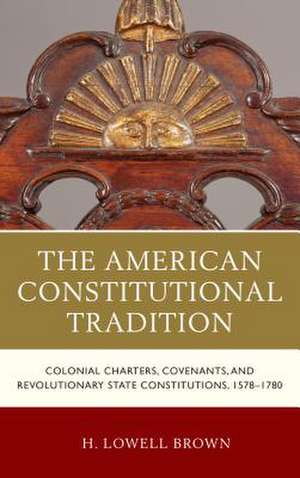AMERICAN CONSTITUTIONAL TRADITPB: The Fairleigh Dickinson University Press Series in Law, Culture, and the Humanities
Autor H. Lowell Brownen Limba Engleză Paperback – 9 iun 2019
Din seria The Fairleigh Dickinson University Press Series in Law, Culture, and the Humanities
-
 Preț: 542.61 lei
Preț: 542.61 lei -
 Preț: 254.58 lei
Preț: 254.58 lei - 23%
 Preț: 456.77 lei
Preț: 456.77 lei -
 Preț: 415.17 lei
Preț: 415.17 lei -
 Preț: 348.21 lei
Preț: 348.21 lei -
 Preț: 399.02 lei
Preț: 399.02 lei -
 Preț: 309.62 lei
Preț: 309.62 lei -
 Preț: 426.55 lei
Preț: 426.55 lei - 27%
 Preț: 777.33 lei
Preț: 777.33 lei -
 Preț: 310.64 lei
Preț: 310.64 lei -
 Preț: 366.06 lei
Preț: 366.06 lei - 23%
 Preț: 708.48 lei
Preț: 708.48 lei - 23%
 Preț: 616.07 lei
Preț: 616.07 lei - 27%
 Preț: 776.06 lei
Preț: 776.06 lei - 23%
 Preț: 652.20 lei
Preț: 652.20 lei - 27%
 Preț: 726.83 lei
Preț: 726.83 lei - 23%
 Preț: 649.85 lei
Preț: 649.85 lei
Preț: 395.91 lei
Nou
Puncte Express: 594
Preț estimativ în valută:
75.76€ • 79.30$ • 63.05£
75.76€ • 79.30$ • 63.05£
Carte tipărită la comandă
Livrare economică 31 martie-14 aprilie
Preluare comenzi: 021 569.72.76
Specificații
ISBN-13: 9781683930495
ISBN-10: 1683930495
Pagini: 252
Dimensiuni: 152 x 229 x 16 mm
Greutate: 0.34 kg
Editura: Rowman & Littlefield
Seria The Fairleigh Dickinson University Press Series in Law, Culture, and the Humanities
ISBN-10: 1683930495
Pagini: 252
Dimensiuni: 152 x 229 x 16 mm
Greutate: 0.34 kg
Editura: Rowman & Littlefield
Seria The Fairleigh Dickinson University Press Series in Law, Culture, and the Humanities
Notă biografică
By H. Lowell Brown
Cuprins
Part I Constitutionalism in Colonial America, 1578 To 1775
Foreword
Chapter 1 The Enterprise Colony of Virginia
Chapter 2 The Covenant Colonies of New England
Chapter 3 The Proprietary Colonies of The Mid-Atlantic
Chapter 4 The Emergence of the American Constitutional Tradition in the Age of the Imperium
Part II Revolutionary Constitutionalism
Chapter 5 The Quest for Federal Union
Chapter 6 The Revolutionary State Constitutions
Chapter 7 The American Constitutional Tradition in The Revolutionary Era
Bibliography
Descriere
Closer examination of foundational, revolutionary documents, and of the colonial legislation enacted on the basis of those foundational documents, reveals an American tradition of constitutionalism that the Revolutionaries were able to draw upon when fashioning their constitutions for the newly independent states and for the federal government.
